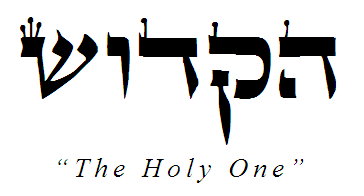|
Introduction
The idea of the holy (kadosh) implies differentiation: the realm of the holy is entirely set apart from the common, the habitual, or the profane. The holy is singular, awe-inspiring, even "terrible" or dreadful (see Neh. 1:5; Psalm 68:35).
As the Holy One (hakkadosh), YHVH is utterly unique, distinct, sacred, and set apart as the only One of its kind. He alone is worthy of true worship and adoration, since He alone is utterly peerless, without rival, and stands in relation to the world as Creator and Lord. Yes, only the Lord is infinitely and eternally Other -- known to Himself as "I AM THAT I AM" (Exo. 3:15). To say that God is holy is to affirm that He is uniquely to be hallowed as utterly sacred.
In Jewish thinking, "holiness" is an equivalent general term for "Godhead," and the adjective "holy" is synonymous with "Divine" (see Dan 4:8,9,18; 5:11). The Lord's "holy arm" (Isa 52:10; Ps 98:1) is His Divine arm, and His "holy Name" (Lev 20:3, etc.) is His Divine name. In fact, for many Jews, Hakkadosh Barukh Hu, "The Holy One blessed be He", is a synonym for the Sacred Name of God itself.
The Holy One


Hakkadosh.
The Holy One. The One set apart as utterly perfect and unique, utterly transcending the realm of the finite, the fallen, and the imperfect. Only God is worthy of worship, for He alone is holy.
Holy One


Kadosh.
The Holy (One) (Isa. 40:25).
The Holy One, blessed be He


Hakkadosh Barukh Hu.
The Holy One, blessed be He.
Another Name for God (used especially among Orthodox Jews) instead of Hashem. In Jewish thinking, "The Holy One, blessed be He," is one of the most commonly used designations for God.
YHVH the Holy God


Adonai ha'elohim hakkadosh.
Adonai the Holy God (1 Sam. 6:20).
The Holy One of Israel


K'dosh Yisrael.
The Holy One of Israel. This title is especially frequent in the prophecy of Isaiah (in all parts). It serves to place the sins of Isaiah's society in stark contrast to God's moral perfection (Isa 30:11) and expresses God's absolute separation from evil (Isa 17:7).
References: 2 Ki. 19:22; Ps. 71:22; Isa. 1:4; 5:19, 24; 10:20; 12:6; 17:7; 29:23; 30:11f, 15; 31:1; 37:23; 41:14; 43:3, 14; 45:11; 47:4; 48:17; 54:5; 60:14; Jer. 50:29.
The Holy God of Israel


El k'dosh Yisrael.
The Holy One of Israel. (variant spelling)
YHVH my Holy God


Adonai Elohai Kedoshi.
The Lord my Holy God (Hab. 1:12).
The Holy God


Ha-El Hakkadosh.
The Holy God (Isa. 5:16).
 |
|

